

Sermons. Prophecy. Prophecy, whether we are receiving a word of prophecy or giving one should be a life changing experience.
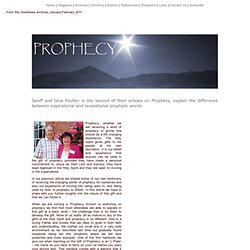
The Holy Spirit gives gifts to his people at his own discretion. It is our belief and experience that anyone can be used in the gift of prophecy provided they have made a personal commitment to Jesus as their Lord and Saviour, they have been baptised in the Holy Spirit and they are open to moving in the supernatural. In our previous article we shared some of our own testimony of receiving life-changing words of prophecy for ourselves and also our experience of moving into being open to, and being used by God, to prophesy to others. In this article we hope to share with you further insights into the nature of this gift and how we can foster it.
When we are running a ‘Prophecy School’ or workshop on prophecy we find that most attendees are able to operate in this gift at a basic level – the challenge then is for them to develop the gift. Edify, Encourage or Comfort. Prophecy - Gift of the Holy Spirit. The gift of prophecy edifies, exhorts, and comforts (I Corinthians 14:3); helps us build up or strengthen; and should lead us to the Word of God.
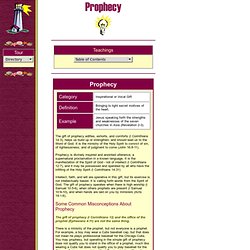
It is the ministry of the Holy Spirit to convict of sin, of righteousness, and of judgment to come (John 16:8-11). Prophecy is divinely inspired and anointed utterance; a supernatural proclamation in a known language. It is the manifestation of the Spirit of God - not of intellect (I Corinthians 12:7), and it may be possessed and operated by all who have the infilling of the Holy Spirit (I Corinthians 14:31) Intellect, faith, and will are operative in this gift, but its exercise is not intellectually based. It is calling forth words from the Spirit of God. Some Common Misconceptions About Prophecy The gift of prophecy (I Corinthians 12) and the office of the prophet (Ephesians 4:11) are not the same thing.
This Is It. The Marriage Video Every Young Couple Should Watch Before They Say, “I Do” Why identity is fundamental to discipleship. As a church family full of members—those who are faithful in community, serving, giving, and mission—I want to help you see this Ephesians series in context.
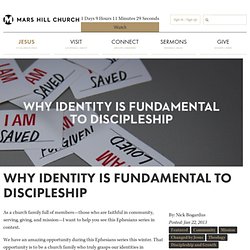
We have an amazing opportunity during this Ephesians series this winter. That opportunity is to be a church family who truly grasps our identities in Christ—the absolute fundamental part of our lives and mission. Fundamentals can make or break you John Wooden, the legendary UCLA basketball coach, used to start his teams’ first practice not with shooting, defensive schemes, or even passing—he started with teaching them how to put their socks on. He explained that because basketball was a game of sudden starts and stops, if there was a wrinkle in their socks, they’d get blisters. I Am ____? Who Do You Think You Are?
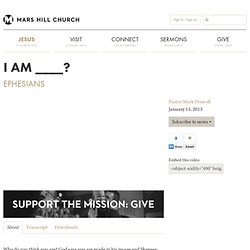
Who do you think you are? That question is identity-shaping, life-altering, eternity-affecting. How would you describe yourself? How do you introduce yourself? How do you perceive yourself? How would you answer this question: I am “blank”? We’re going to spend sixteen weeks answering this question, and it’s a question that we all ask ourselves, sometimes consciously, sometimes less consciously. What names did others give you? As we continue forward in life and we hit the teen years, then it becomes incredibly complicated.
Triumph Over Suffering: A Spiritual Guide To Conquering Adversity (3rd Edition): Celeste Li M.D., Jenna Julianna Li: 9780984151530: Amazon.com. Daniel Chapter 6. Introduction to Chapter 6 The sixth chapter of Daniel is another target for critics.
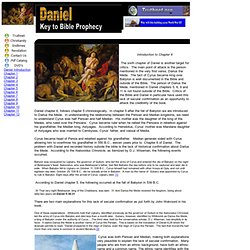
The main point of attack is the person mentioned in the very first verse, Darius the Mede. The fact of Cyrus became king over Babylon is well documented in the Bible and outside of the Bible. The person of Darius the Mede, mentioned in Daniel chapters 5, 6, is not found outside of the Bible. Critics of the Bible and Daniel in particular have used this lack of secular confirmation as an opportunity to attack the credibility of the book.
Daniel chapter 6, follows chapter 5 chronologically. Cyrus became head of Persia and rebelled against his grandfather. Daniel: A Living Example For Today’s Society : Prevail Magazine. It is God’s intention that every generation recognize the timelessness of the Bible.
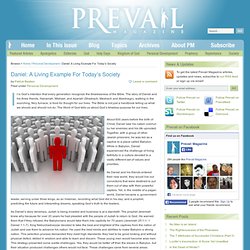
The story of Daniel and his three friends, Hananiah, Mishael, and Azariah (Shadrach, Meshach and Abednego), walking in the scorching, fiery furnace, is food for thought for our lives. The Bible is not just a handbook telling us what we should and should not do. The Word of God tells us about God’s timeless purpose for our lives. About 600 years before the birth of Christ, Daniel saw his nation overrun by her enemies and his life uprooted. Together, with a group of other Jewish prisoners, he was led as a captive to a place called Babylon. As Daniel and his friends entered their new world, they would live out convictions that were destined to put them out of step with their powerful captors. As Daniel’s story develops, Judah is being invaded and business is at a standstill. 1. These are the problems that either shape our character or reveal it. 2. The king’s delicacies were not necessarily bad. 3. Daniel: A Living Example For Today’s Society : Prevail Magazine.